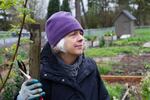
Melinda Jackson
Amelia Templeton / OPB
The Errol Heights Community Garden sits at the end of a bumpy gravel road on the very southern edge of Portland.
Melinda Jackson, a retired speech therapist, walks here almost every day. "In the spring and summer and fall, it's my favorite thing," she says.
Jackson grows salad greens, cucumbers, tomatoes, and raspberries in her plot. But this year, she's not sure how much she's going to plant.
"This is the red zone. We're in the area that showed the highest concentrations for arsenic and nickel," she says.
Those heavy metals turned in up in moss samples collected by U.S. Forest Service researchers.
State environmental regulators still haven't identified where the arsenic is coming from, but they do know the source of the nickel: it's a large metal foundry owned by Precision Castparts, Oregon's second-largest company and, according to at least one study, one of the country's top air polluters.
The foundry, which the company calls the PCC Structurals Large Parts Campus, also emits chromium and cadmium.
Jackson's community garden is surrounded by small homes and a wooded ravine filled with birds. It feels almost rural. But just a few blocks away, next to Johnson Creek, there's a long strip of industrial parks and factories.
The Precision Castparts foundry sits on the other side of the ravine. Inside, crews make complex parts for the aerospace industry using a process called investment casting.
A corporate video shows workers pouring molten metal into large ceramic molds.
"We manufacture some of the largest one piece structural investment castings in the world, in nickel, titanium, aluminum and steel alloys," the narrator says.
A Change In Surroundings
The company has operated on the site since the 1950s. Then it was surrounded by farms. Now it's surrounded by homes.
Community activist Jacob Sherman lives about a mile away in the Brentwood-Darlington neighborhood.
"There's about 10,000 to 12,000 people that live in this nickel hot spot, both in Brentwood-Darlington, Woodstock, Eastmoreland, as well as into Milwaukie," Sherman says. "And that's very concerning."
Sherman says this is isn't the first time the company has been in the news as a major source of toxic exposure.
"People in the neighborhood have been concerned about Precision Castparts going back to about 2011 when they had a toxic orange cloud release," he says.
Five years ago a power failure caused a major industrial accident at the factory and sent a plume of nitrogen dioxide into the air. Some people in the neighborhood were told to shelter in their their homes.
State regulators fined the company less than $30,000 dollars for that incident.
It wasn't the last accident. Two years ago, a tank at the factory overflowed, spilling hot water and acid into the city sewers, according to Oregon Department of Environmental Quality records.
Precision Castparts isn't a small, local company: It has more than 150 factories around the world. Warren Buffett recently bought it for $37 billion. It's also one of the nation's top corporate air polluters, according to a team at the University of Massachusetts.
The team used the data companies self-report to the Environmental Protection Administration to rank businesses based on the chronic human health risk posed by all emissions from their facilities in the United States.
The Question Remains: How Bad Is The Air?
Precision Castparts ranked number 20 on that list of the nation's most toxic air polluters. It ranked better than Koch Industries but worse than British Petroleum and Royal Dutch Shell. The company disputes that ranking, saying the researchers overestimated the toxicity of the metals alloys it uses.
People who live near the foundry in Portland still have very little specific information about how much metal dust is in the air they breathe in every day or if it affects their health.
For years, state regulators haven't tested the air quality outside the factory, even after that University of Massachusetts study identified the company as a top polluter.
Nina De Concini is the northwest manager for the Oregon Department of Environmental Quality. She notes that the company's permits have been in order.
"I guess what I could say on the record is that one study alone would not necessarily be the basis for the placement of an air monitor," she says.
But just this month, after years of pleading from neighbors, DEQ did put up air quality monitors near the factory. That data could reveal the source of the arsenic mentioned at the beginning of this story. Precision Castparts says it's highly unlikely the arsenic is coming from them. DEQ says it could be.
De Concini says the air quality monitor will also show whether people are breathing in metal pollution at levels that put them at higher risk for health problems like cancer.
"We hopefully will know by the end of this month what data we have and what it's showing," she says.
In the meantime, with little information to guide them, residents are trying to figure out how or whether they need to protect their health.

Elise Erikson, left, is a nurse and midwife who lives in a suburb less than a mile from the factory.
Amelia Templeton / OPB
Life Near The Factory
Elise Erikson is a nurse and midwife who lives in a suburb less than a mile from the factory. Her husband works as an architect in Portland. Their son, a toddler, likes playing with firetrucks.
The family moved here from Chicago and had never heard of Precision Castparts.
"We didn't really do any environmental research before we moved here," she says. "We were just trying to find a house we can afford. And we couldn't afford anything in Portland. This was the next best thing. We found a good house and went for it."
Erikson is three months pregnant and recently asked her doctor to test the level of nickel in her urine. She figured the test would come back normal, and she'd be reassured.
Instead, her test came back higher than the normal range. Now she's confused.
Nickel is a naturally occurring metal. It's found in foods, including chocolate, nuts and oatmeal. But nickel dust is also a known carcinogen.
"We don't know what to do to minimize our risk at this point. Is it something we can control in our house? Should I just not spend a whole lot of time outside in our neighborhood. Is there even a link to this level and some adverse consequence?" Erikson says. "I don't know."
Erikson says she thinks state regulators should encourage people to get tested so they can start gathering data and identify specific risk factors that might increase people's exposure to the air pollution.
Back at the Errol Heights Community Garden, Melinda Jackson prunes her raspberries and, like Erikson, wishes she had more information. Jackson wants soil testing done here. She says this garden usually donates thousands of pounds of produce to a local food bank.
"Before we give another ton of produce I'd like to know that the produce is fit for consumption," she says. "That's my main concern."
Precision Castparts Responds
Precision Castparts declined an interview request. But the company did provide detailed answers to questions via email. Read their full response.
The company did announce that it will install a half dozen new filters and pollution control devices at its factory in South Portland. The company says that is on top of 30 special filters, known as baghouses, already used to control metal dust at the foundry.
The company said the new filters will reduce metal dust emissions there by more than 90 percent. Chris Myers, the environmental health and safety director for PCC Structurals, described the updates in writing to DEQ:
"Adding these controls is beyond anything required by the DEQ air permitting program," he wrote. "But it is consistent with our goal of continuous improvement."
